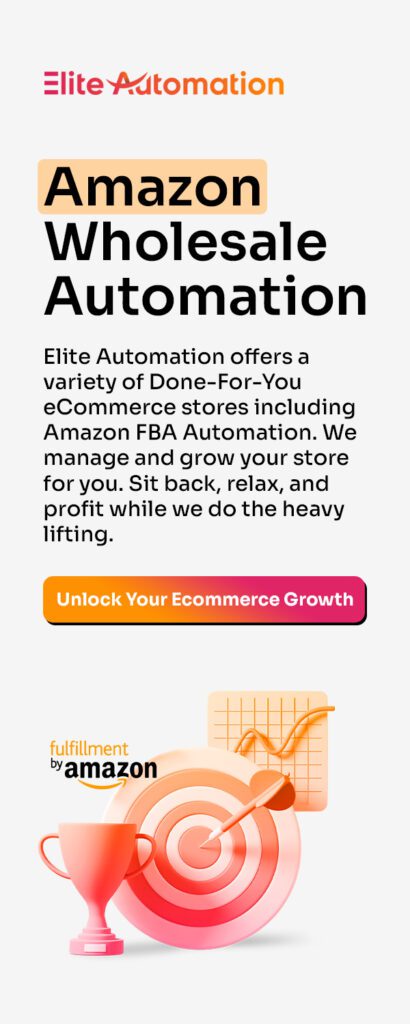Starting an ecommerce business can be exciting, but it also comes with business risks. To ensure that your online store is properly protected from potential losses, you need to invest in the right type of ecommerce business insurance. This type of coverage provides protection for any unexpected events or accidents related to running your online shop such as property damage and legal liability issues. In this blog post we will discuss what ecommerce business insurance is, how to choose the right policy for your needs, common types of coverage available and tips on finding affordable options so you can protect yourself without breaking the bank!
Table of Contents:
- What is Ecommerce Business Insurance?
- How to Choose the Right Ecommerce Business Insurance Policy?
- Common Types of Ecommerce Business Insurance Coverage
- Cost of Ecommerce Business Insurance
- Tips for Finding Affordable Ecommerce Business Insurance
- FAQs in Relation to Ecommerce Business Insurance
- Conclusion
What is Ecommerce Business Insurance?
Ecommerce insurance is a type of insurance that covers the risks associated with running an online store. It provides protection against financial losses due to lawsuits, accidents, and other unforeseen events.
Types of Coverage: There are several types of coverage available for ecommerce businesses. General liability insurance covers claims related to bodily injury or property damage caused by your products or services. Product liability insurance protects you from claims arising out of defective products sold on your website. Professional liability insurance helps cover legal costs if you’re sued for negligence in providing professional advice or services through your website.
Benefits of Having Insurance: Having ecommerce business insurance can provide peace of mind knowing that you’re protected against potential liabilities and losses due to unexpected events such as data breaches, cyber-attacks, product recalls, natural disasters, and more. It also ensures that any legal fees incurred during a lawsuit will be covered by the policy instead of coming out of pocket expenses for the business owner.
Pro Tip: Be sure to check out several insurance providers to see who best fits your business’ unique needs. There are several types of insurance also including business interruption insurance which may be helpful if your eCommerce store was impacted by the COVID-19 pandemic.
Ecommerce business insurance is an essential component of any online business and can help protect your assets, customers, and employees. It’s important to choose the right policy that meets your specific needs in the eCommerce industry in order to ensure you’re properly covered. Now let’s look at how to choose the right ecommerce business insurance policy.
How to Choose the Right Ecommerce Business Insurance Policy?
Choosing the right ecommerce business insurance policy is an important decision that can help protect your business from unexpected losses. It’s essential to understand what type of coverage you need and how much it will cost before making a purchase.
Consider Your Risks and Liabilities: The first step in choosing the right ecommerce business insurance policy is to assess your risks and liabilities. Think about what types of events could cause financial harm to your company, such as customer injuries or product defects, and consider whether these risks are covered by any existing policies.
Additionally, look into potential legal liabilities that may arise due to negligence or errors on your part. This will help you determine which types of coverage are necessary for your business. Ecommerce business owners should consider purchasing products liability insurance from insurance companies to protect themselves from potential lawsuits stemming from defective or harmful products. Certainly look into product liability coverage as well as data breach insurance where client or customer information may have been exposed.
eCommerce retailers should also consider getting insurance coverage for protection against potential losses from theft or compromise of sensitive credit card information.
Compare Different Policies and Providers: Once you have identified the types of coverage and insurance products needed for your ecommerce business, compare different policies offered by various providers. Look at factors such as price, deductible amounts, limits on claims payouts, exclusions in the policy language, degree of product liability coverage, customer service ratings, etc., so that you can make an informed decision when selecting a provider.
If there are any areas where you feel uncertain about which type of coverage would be best for your situation or if there are questions regarding specific clauses in a policy document, it is wise to seek professional advice from an experienced insurance broker who specializes in this field. They can provide valuable insight into finding the most suitable protection for your particular needs while helping ensure compliance with applicable laws and regulations related to ecommerce businesses operating within certain jurisdictions.
When choosing the right ecommerce business insurance policy, it is important to consider your risks and liabilities, compare different policies and providers, and get professional advice when needed. Knowing what type of coverage you need can help protect your business from potential losses.
Common Types of Ecommerce Business Insurance Coverage
General Liability Insurance is a type of insurance coverage that provides protection against claims arising from bodily injury, property damage, and personal or advertising injury. This type of coverage can help protect your business from potential losses or damages due to accidents, negligence, or other incidents. For example, if someone slips and falls on your premises and sustains an injury, general liability insurance can provide financial protection for medical expenses as well as legal fees associated with the claim.
Product Liability Insurance is designed to cover any costs related to product defects that cause harm to customers. It helps protect businesses from lawsuits resulting from defective products they manufacture or sell. For instance, if you sell a faulty product that causes physical harm to someone who uses it then this type of insurance will help cover the cost of defending yourself in court as well as any compensation you may be required to pay out should you lose the case.
Professional Liability Insurance protects small business owners against claims related to professional services provided by employees such as consulting advice given by accountants or lawyers which results in economic loss for their clients. This type of coverage also covers errors made during the course of providing services, such as incorrect tax filing advice given by an accountant which leads their client into trouble with the IRS. Professional liability insurance helps ensure that these types of mistakes don’t lead to costly legal battles for your business down the line
Ecommerce business insurance is an essential part of running a successful online store, and understanding the different types of coverage available is key to protecting your business. Next, let’s explore how much ecommerce business insurance costs.
Pro Tip: Depending on the unique needs of your business, you can also look into Workers’ compensation insurance, business property insurance, comp insurance, and business interruption insurance to ensure liability coverage. Sometimes these are bundled together in packages.
Cost of Ecommerce Business Insurance
The cost of ecommerce business insurance can vary significantly depending on the type and amount of coverage you need. Factors such as your industry, size of business, location, claims history, and other factors all play a role in determining the cost. Generally speaking, the more coverage you have, the higher your premiums will be.
When it comes to average costs for different types of ecommerce business insurance policies, general liability insurance is typically one of the most affordable options with an average annual premium ranging from $500 to $2,000 depending on your risk profile. Product liability insurance tends to be slightly more expensive than general liability but still relatively affordable with an average annual premium between $1,000 and $3,000 per year. Professional liability or errors & omissions (E&O) coverage can range anywhere from a few hundred dollars up to several thousand dollars per year depending on how much protection you need and what kind of risks are associated with your business operations.
Pro Tip: Ecommerce businesses can protect their business property with insurance coverage specific to their needs and industry. Don’t forget about business interruption insurance.
Tips for Finding Affordable Ecommerce Business Insurance
Finding affordable ecommerce business insurance can be a daunting task. However, with the right approach and resources, you can find an insurance policy that meets your needs without breaking the bank. Here are some tips to help you get started:
Shop Around for Quotes: Shopping around is one of the best ways to find an affordable ecommerce business insurance policy. Compare quotes from different providers and look for discounts or bundles that may be available. Don’t forget to factor in any additional fees such as administrative costs or taxes when comparing policies. You should also consider whether you need specialized coverage for certain aspects of your business, such as cyber liability or product liability protection.
Look for Discounts and Bundles: Many insurers offer discounts if you bundle multiple policies together under one provider, so it pays to shop around and compare prices between different companies before making a decision. Additionally, many insurers will offer discounts if you have taken steps to protect your business from potential risks such as installing security systems or implementing employee safety protocols. Make sure to ask about these types of discounts when shopping around for quotes.
There are numerous online resources available that can help make finding affordable ecommerce insurance easier. Websites like Insureon allow businesses to compare rates from multiple carriers in just minutes while providing helpful advice on selecting the right coverage options based on their unique needs and budget constraints. Additionally, many websites provide reviews from customers who have used specific providers so entrepreneurs can make informed decisions when choosing their insurer for ecommerce insurance.
FAQs in Relation to Ecommerce Business Insurance
What kind of insurance do I need for ecommerce?
When running an ecommerce business, it’s important to ensure that you have the right ecommerce insurance or retail business insurance coverage in place. Depending on your specific business and operations, this may include general liability insurance, product liability insurance, professional indemnity insurance, cyber liability insurance and/or employer’s liability insurance. It is also recommended to consider other forms of protection such as public liability or personal accident cover for employees. Speak with a qualified broker or insurer to determine what type of coverage best suits your needs.
Do you need insurance for an ecommerce business?
Yes, insurance is an important part of running a successful ecommerce business. It can protect you from financial losses due to unexpected events such as natural disasters, cyber-attacks, or employee theft. Insurance can also help cover the costs associated with legal action taken against your business and provide coverage for any liabilities that may arise from selling products online. Ultimately, having the right insurance in place will give you peace of mind knowing that your business is protected should anything go wrong.
How much does insurance cost for an ecommerce business?
The cost of insurance for an ecommerce business depends on the type and size of the business, as well as the level of risk involved. Generally speaking, businesses with higher levels of risk (such as those that store customer data or handle large amounts of money) will require more comprehensive coverage and thus have higher premiums.
Businesses with lower levels of risk (small business owners in some cases) may be able to get away with less expensive policies. Ultimately, it is important to consult a qualified insurance broker who can assess your specific needs and provide you with accurate quotes for different types of coverage.
How much is a $2 million dollar insurance policy for a business?
The cost of a $2 million dollar insurance policy for a business will depend on the type and size of the business, as well as its risk profile. Generally speaking, businesses can expect to pay anywhere from several hundred dollars per year up to tens of thousands depending on their needs. Business owners should always consult with an experienced insurance agent or broker in order to determine the best coverage and pricing for their specific situation.
Conclusion
Ecommerce business insurance is an important part of any online business. It can provide protection from unexpected losses and help ensure the longevity of your business. When choosing a policy, it’s important to consider what type of coverage you need, as well as how much you can afford to pay for ecommerce business insurance.
By researching different policies and comparing quotes, you can find an affordable option that meets your needs. With the right ecommerce business insurance in place, you can rest assured knowing that your online venture is protected against unforeseen risks.
Are you an e-commerce business looking for ways to stay ahead of the competition? Do you want to make sure your online store is secure and insured against potential risks? We offer eCommerce Automation where we actually build and manage your eCommerce store for you — Look no further! Our team at Elite Automation can provide invaluable advice, tips, news and trends regarding all aspects of running a successful online store.
We offer automated services that will help streamline processes while making sure your business remains protected with insurance coverage. Get started now by reaching out to a customer service or sales rep today – we look forward to helping you succeed!





